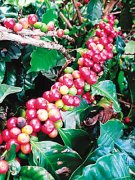Democratic Republic of the Congo (DRC) to strengthen coffee industry to develop coffee information coffee network
High-quality coffee beans are refined by water treatment. The coffee beans with less impurities can be obtained by the water washing method, but if the water quality and time are not properly controlled during the fermentation process, the coffee beans will easily be infected with the sour taste of excessive fermentation. and dry beans also need to pay attention to timely re-inspection to prevent coffee beans from being contaminated by wet ground and sundries. Processed beans should be dried in time, and the drying should also have a certain degree. Generally, the moisture content of processed beans is 11% 13%. Insufficient drying can easily make beans moldy, and excessive drying can easily affect the flavor of beans.
According to a report by the Democratic Republic of the Congo (DRC), Minister of Agriculture, Fisheries and Animal Husbandry Mwewu pointed out during a recent visit to the country's national coffee office that the development of the coffee industry will be strengthened, the gross domestic product (GDP) will be increased, and farmers' income will be increased. Kong (Jin) currently has a coffee processing plant with a processing capacity of 120000 tons of coarse coffee, but its annual output has only reached 8000 tons. Kong (Jin) coffee is of good quality. due to the backward production technology, the yield per hectare is only 200kg. The Congolese government will increase technical and financial investment and introduce improved varieties to make the yield of coffee reach 3000 kg per hectare.

Important Notice :
前街咖啡 FrontStreet Coffee has moved to new addredd:
FrontStreet Coffee Address: 315,Donghua East Road,GuangZhou
Tel:020 38364473
- Prev

The annual consumption of coffee paper cups in the UK is huge, but the recovery rate of coffee is less than 1%.
Boutique coffee has a strict grading system. Generally, raw beans are preserved in parchment coffee beans in the form of endocarp after processing, and the endocarp is removed before export. Go through a strict grading process to ensure the uniformity of quality. And it is very important to preserve the protection in the process of transportation, such as the control of temperature and humidity, the control of ventilation, avoiding odor adsorption and so on.
- Next

Can coffee help you lose weight? the efficacy of coffee
First, coffee weight loss effect 1, caffeine can accelerate the decomposition of fat after coffee is absorbed by the human body, it can accelerate the decomposition of fat, thereby increasing the content of fatty acids in the blood. Once the concentration of fatty acids in the blood increases, the fatty acids are absorbed by the muscles through the blood vessels and consumed in the form of energy. 2. Coffee stimulates the movement of large intestine. Scientists' experiments show that
Related
- The ceremony is full! Starbucks starts to cut the ribbon at a complimentary coffee station?!
- A whole Michelin meal?! Lucky launches the new "Small Butter Apple Crispy Latte"
- Three tips for adjusting espresso on rainy days! Quickly find the right water temperature, powder, and grinding ratio for espresso!
- How much hot water does it take to brew hanging ear coffee? How does it taste best? Can hot water from the water dispenser be used to make ear drip coffee?
- What grade does Jamaica Blue Mountain No. 1 coffee belong to and how to drink it better? What is the highest grade of Blue Mountain coffee for coffee aristocrats?
- What are the flavor characteristics of the world-famous coffee Blue Mountain No. 1 Golden Mantelin? What are the characteristics of deep-roasted bitter coffee?
- Can I make coffee a second time in an Italian hand-brewed mocha pot? Why can't coffee be brewed several times like tea leaves?
- Hand-brewed coffee flows with a knife and a tornado. How to brew it? What is the proportion of grinding water and water temperature divided into?
- What is the difference between Indonesian Sumatra Mantinin coffee and gold Mantinin? How to distinguish between real and fake golden Mantelin coffee?
- What does bypass mean in coffee? Why can hand-brewed coffee and water make it better?

